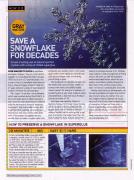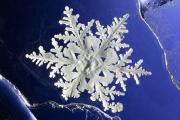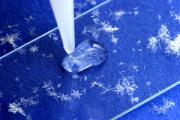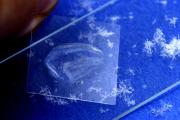| Save a Snowflake for DecadesCreate a lasting cast of nature's perfect crystals with a drop of chilled superglue. |
| |
|
| |
Ever wanted to catch a snowflake and keep it forever? You can. This is a photograph of a snowflake that fell in January 1979, but it isn't a 27-year-old photo. It is a recent shot of a snowflake that's been sitting in chemist Tryggvi Emilsson's desk for 27 years, locked in a drop of that miracle of modern chemistry we call superglue. The 'super' in the thin, runny adhesive, which was invented during World War II, is the small molecules in it called cyanoacrylate monomers that penetrate and interlock with the microscopic forms of anything they touch. The glue hardens when the monomers link together, or polymerize, head-to-tail into long chains called polymers. This process is triggered by any minute trace of water or water vapor and progresses very quickly, which is why superglue hardens more rapidly on moist things, such as your fingers, than on the thing you're trying to glue.
The tendencies of superglue to seep into the tiniest nooks and crannies, harden on contact with water, and solidify rapidly make it perfect for taking an impression of something that is very small, made of water, and ephemeral, a fact that struck Emilsson during the winter of '79.
He'd been fascinated by Wilson A. Bentley's famous 1931 book Snow Crystals, which contains 2,453 snowflake photographs taken over 47 freezing Vermont winters. Bentley had to work quickly to get each shot before the radiant heat from his body melted the flake. Despite being from Iceland (or perhaps because of it), Emilsson wasn't about to endure long bouts of biting cold, so he came up with the superglue method described below, which lets you capture snowflakes outside and examine them later in the comfort of your living room. In front of a crackling fire, if you like.
Bentley could save just photographs, not the real snowflakes he longed as a child to take home to show his mother. One can only imagine what a collection he would have built if he'd had a few hundred tubes of superglue. Perhaps we'll see when a modern-day Bentley comes along. Who knows, maybe it's you.
Scan of printed version:
 |
| |
|
| |
|
| |



1. Set microscope slides, coverslips and superglue outside when it's 20°F or colder to chill them. Catch flakes on the slides or pick them up with cold tweezers.
2. Place a drop of superglue on the snowflake. Note: Gel glue doesn't work. Find a brand that's thin and runny.

3. Drop a coverslip over the glue. Don't press down hard or the flake could tear or melt from the heat of your finger.
4. Leave the slide in a freezer for one or two weeks and don't touch it with warm hands. The glue must completely harden before the snowflake warms up.
Photo Credits:
Theodore Gray
Theodore Gray
Theodore Gray
Theodore Gray
|
|